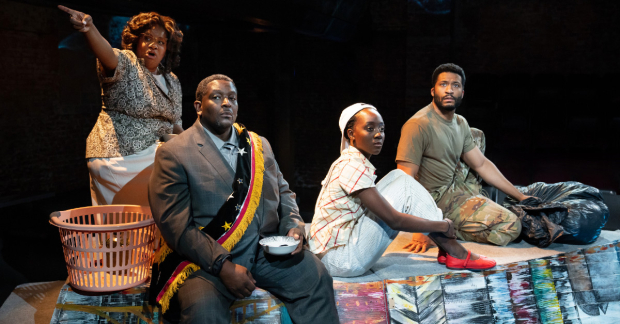Review: An Epic Journey Through History and Culture in Black Odyssey
Marcus Gardley’s playful riff on Homer makes its New York premiere at Classic Stage Company.

(© Julieta Cervantes)
After last hitting off-Broadway with The House That Will Not Stand, a 19th-century riff on Lorca's The House of Bernarda Alba, Marcus Gardley has taken on an even bigger literary property for his latest New York premiere, black odyssey (Gardley has chosen to style the title in lowercase). Yes, as its title suggests, Gardley's latest work is a Black-oriented take on Homer's Odyssey, updated to contemporary America. The result is, if not necessarily Gardley's best work to date, surely his most purely enjoyable. At the very least, the episodic structure of Homer's epic poem has inspired an exhilaratingly freewheeling quality that was only partially in evidence in some of Gardley's earlier plays.
Part of the fun of black odyssey lies in simply seeing Gardley's updates of the original Homeric characters and settings. Odysseus is now Ulysses Lincoln (Sean Boyce Johnson), a psychologically scarred soldier trying to make his way back home from Afghanistan to his wife Nella P. (D. Woods) and son Malachai (Marcus Gladney Jr.) in Harlem. The gods are still present in Gardley's odyssey: principally Deus (James T. Alfred) engaging in a chess match with Paw Sidin (Jimonn Cole), who's obsessed with taking revenge on Ulysses for killing his son in Afghanistan. In the middle of this battle of immortal wills is Athena, who comes to Earth as Aunt Tee (Harriett D. Foy) to help Nella P. maintain her faith that her husband will eventually return.
Even more imaginative are Gardley's reinventions of the characters and situations Ulysses encounters along the way. Circe (Adrienne C. Moore) enters the stage wearing an MTA train conductor's uniform before taking it and much more off for a striptease in which she equates soul food and sex. The prophet Tiresias has been given a jive-talking '70s makeover, here named Super Fly Tireseas (also Alfred) and sporting a mountainous afro. Perhaps most amusing of all are the Sirens, whom Gardley depicts as a trio of popular Black singers, with Scylla (also Foy) done up as Diana Ross, Carib'diss (also Moore) channeling Tina Turner, and the third "Soul Siren" (Lance Coadie Williams) sporting a James Brown-like snarl.
Gardley's play is about much more than just such playful details, however. Ulysses encounters a family, the Sabines — including patriarch Artez (also Williams), matriarch Alsendra (also Moore), and daughter Benevolence (Tẹmídayọ Amay) — who are atop a raft in a Hurricane Katrina-like situation as they're waiting for assistance from the US government that may never come. Malachai gets involved with Black Lives Matter protests, getting thrown into jail as a result. References to victims of lynchings, police shooting, and other such injustices toward the Black community abound (Emmett Till, the Scottsboro boys, and George Floyd are all cited, among many others).
On a broader level, the play doubles as Ulysses's way of working through his guilt over killing Paw Sidin's son. It's an arc that, however movingly performed by Johnson, feels slightly cliched compared with what has come before. In this case, though, Gardley has taken us on such a vibrant journey through the heart of Black-American history and culture that it doesn't quite matter if the destination is not quite as satisfying by comparison.
It's a journey that, especially under Stevie Walker-Webb's direction, is as much about joy as it is about pain. Music is very much a part of this production, with some performers occasionally breaking out into gospel tunes (Linda Tillery is credited as vocal composer and musical director, Molly Holm as co-musical director) and step dances (choreographed by Aquila Kikora Franklin and PJ Johnnie Jr.), and a percussionist, Ayinde Webb, occupying a corner of the top part of the Classic Stage Company performance space. Costume designer Kindall Houston Almond clothes these characters in a panoply of colorful African robes, sashes, and head pieces. David Goldstein's set design may be relatively spare, but the blue glass platform that lines the front part of the performance space evokes the sea beautifully, and Adam Honoré's lighting design picks up the slack in evoking various settings and time periods.
Above all, the ensemble brims with energy and abandon in bringing these characters to life. Alfred and Cole evoke the appropriate imposing authority as the two warring gods, though Foy proves to be the scene-stealer of the immortals both as Athena and the human Aunt Tee. The cast as a whole works together harmoniously, with everyone given a chance to shine in some way: Woods radiating practicality and faith as the endlessly devoted Nella P., Gladney exuding believably youthful impetuousness as Malachai. And of course, there's Johnson as our epic hero busting out heretofore unknown dance moves during his confrontation with the Sirens. Such sights make Gardley's odyssey a journey worth taking.









